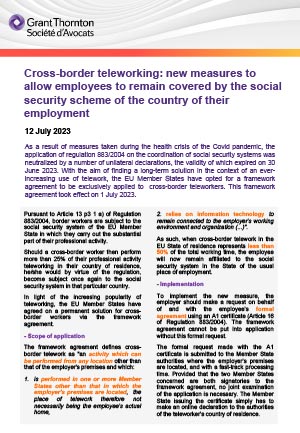-
Tax Policy Management
Tax Policy Management
-
Growth Management
Growth Management
-
Tax audit and litigation
Tax audit and litigation

-
Definition of a strategic and secure transfer pricing structure
Definition of a strategic and secure transfer pricing structure
-
Assistance in the development of international activities and operational reorganisations – “Business restructuring”
Assistance in the development of international activities and operational reorganisations – “Business restructuring”
-
Defense of practices and assistance in the context of tax audits and their follow-up from a litigation viewpoint
Defense of practices and assistance in the context of tax audits and their follow-up from a litigation viewpoint
-
Annual declaration and documentation obligations
Annual declaration and documentation obligations

-
Domestic and international VAT applicable to your company's flow
Domestic and international VAT applicable to your company's flow
-
Banking and financial VAT, VAT in the insurance sector
Banking and financial VAT, VAT in the insurance sector
-
VAT related to real estate registration fees
VAT related to real estate registration fees
-
VAT in the public and non-profit / association sector
VAT in the public and non-profit / association sector
-
Tax audit, tax litigation and relations with the Tax authorities
Tax audit, tax litigation and relations with the Tax authorities
-
Applicable rules for invoicing
Applicable rules for invoicing
-
Customs issues related to your company's international flows
Customs issues related to your company's international flows
-
French VAT registration and compliance obligations
French VAT registration and compliance obligations
-
Payroll tax
Payroll tax
-
Other indirect taxation
Other indirect taxation

-
Company transfer diagnosis
Company transfer diagnosis

-
Distribution strategy : Implementing and structuring
Distribution strategy : Implementing and structuring
-
Distribution activities digitalisation
Distribution activities digitalisation
-
Relations between suppliers and distributors
Relations between suppliers and distributors
-
Contractual policy : etablishing and structuring
Contractual policy : etablishing and structuring
-
Controls and litigation regarding payment terms
Controls and litigation regarding payment terms
-
Organising and securing commercial relations with consumers
Organising and securing commercial relations with consumers
-
Data protection - GDPR
Data protection - GDPR
-
Commercial Leases
Support in the management and contract management of commercial leases.

-
Traditional Services offered
Traditional Services offered
-
Health at work and quality of life at work
Health at work and quality of life at work
-
HR Management Audit
HR Management Audit
-
HR Engineering and People Change
Implementing managerial solutions in line with the company's strategic challenges
-
Management of HR compliance and internal investigations (harassment, discrimination, and whistleblowing)
Management of HR compliance and internal investigations (harassment, discrimination, and whistleblowing)

-
Advice on legal structuring
Advice on legal structuring
-
Day to day company management
Day to day company management
-
Companies reorganisation
Companies reorganisation
-
Mergers & Acquisitions - Private Equity
Mergers & Acquisitions - Private Equity
-
Changes in shareholder structure - Securities issue
Changes in shareholder structure - Securities issue
-
Governance and legal risks management
Governance and legal risks management

-
Development of an international mobility policy
Development of an international mobility policy
-
Coordination of reporting obligations for employees in a mobility situation
Coordination of reporting obligations for employees in a mobility situation
-
Advice on social security
Advice on social security
-
Assistance in labour law
Assistance in labour law

-
Management and protection of your portfolio of property rights
We put the most appropriate protection policy in place for our clients’ intellectual property rights.
-
Securing your projects: advisory and drafting of agreement services
We advise you on the feasibility of your project and the securing of your intellectual property and IT rights.
-
Enforcement of your rights: pre-litigation and litigation
Enforcement of your rights: detection of infringement, pre-litigation and litigation

As a result of measures taken during the health crisis of the Covid pandemic, the application of regulation 883/2004 on the coordination of social security systems was neutralized by a number of unilateral declarations, the validity of which expired on 30 June 2023. With the aim of finding a long-term solution in the context of an ever-increasing use of telework, the EU Member States have opted for a framework agreement to be exclusively applied to cross-border teleworkers. This framework agreement took effect on 1 July 2023.
Pursuant to Article 13 p3 1 a) of Regulation 883/2004, border workers are subject to the social security system of the EU Member State in which they carry out the substantial part of their professional activity.
Should a cross-border worker then perform more than 25% of their professional activity teleworking in their country of residence, he/she would by virtue of the regulation, become subject once again to the social security system in that particular country.
In light of the increasing popularity of teleworking, the EU Member States have agreed on a permanent solution for cross-border workers via the framework agreement.
Scope of application
The framework agreement defines cross-border telework as “an activity which can be performed from any location other than that of the employer's premises and which:
- is performed in one or more Member States other than that in which the employer's premises are located, the place of telework therefore not necessarily being the employee’s actual home,
- relies on information technology to remain connected to the employer's working environment and organization (...)”.
As such, when cross-border telework in the EU State of residence represents less than 50% of the total working time, the employee will now remain affiliated to the social security system in the State of the usual place of employment.
Implementation
To implement the new measure, the employer should make a request on behalf of and with the employee’s formal agreement using an A1 certificate (Article 16 of Regulation 883/2004). The framework agreement cannot be put into application without this formal request.
The formal request made with the A1 certificate is submitted to the Member State authorities where the employer's premises are located, and with a fast-track processing time. Provided that the two Member States concerned are both signatories to the framework agreement, no joint examination of the application is necessary. The Member State issuing the certificate simply has to make an online declaration to the authorities of the teleworker’s country of residence.
Applications are valid for a maximum length of 3 years and may be extended subject to the filing of new applications.
Limited application
- The framework agreement can only be applied between two signatory states. In all other situations, and where only one of the two Member States is signatory to the framework agreement, Regulation 883/2004 remains applicable.
As at 1 July 2023, the Member States signatory to the framework agreement are:
Austria, Belgium, Croatia, the Czech Republic, Finland, France, Germany, Liechtenstein, Luxembourg, Malta, the Netherlands, Norway, Poland, Portugal, Slovakia, Spain, Sweden, Switzerland.
The United Kingdom has already indicated that it will not be signatory to the framework agreement.
- Further to this, the worker must have one employer only, or in the case where there are several employers, they must all be established in the same Member State.
- The framework agreement does not apply to self-employed workers or to workers on secondment within the meaning of Article 12 of Regulation 883/2004.
These new rules only apply to social security bodies and are specific to cross-border working.
Tax law is applied independently which in itself could result in difficulties for cross-border workers.
It is imperative that at a company level the rules governing telework are clarified.
Our legal teams are at your disposal to review any of these points with you.














